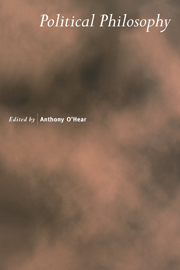Book contents
- Frontmatter
- Contents
- Preface
- Notes on Contributors
- Making the World Safe for Utilitarianism
- Innocent Before God: Politics, Morality and the Case of Billy Budd
- Democracy and Openness
- Rights and Human Rights
- Prerogative to Depart from Equality
- Casting the First Stone: Who Can, and Who Can't, Condemn the Terrorists?
- Against Egalitarianism
- Big Decision: Opting, Converting, Drifing
- The Epistemology of Unjust War
- High Culture, Low Politics
- Edmund Burke and the Anglo-American Tradition of Liberty
- The Politics of Emotion: Liberalism and Cognitivism
- Index of Names
Casting the First Stone: Who Can, and Who Can't, Condemn the Terrorists?
Published online by Cambridge University Press: 04 August 2010
- Frontmatter
- Contents
- Preface
- Notes on Contributors
- Making the World Safe for Utilitarianism
- Innocent Before God: Politics, Morality and the Case of Billy Budd
- Democracy and Openness
- Rights and Human Rights
- Prerogative to Depart from Equality
- Casting the First Stone: Who Can, and Who Can't, Condemn the Terrorists?
- Against Egalitarianism
- Big Decision: Opting, Converting, Drifing
- The Epistemology of Unjust War
- High Culture, Low Politics
- Edmund Burke and the Anglo-American Tradition of Liberty
- The Politics of Emotion: Liberalism and Cognitivism
- Index of Names
Summary
‘No matter what the grievance, and I'm sure that the Palestinians have some legitimate grievances, nothing can justify the deliberate targeting of innocent civilians. If they were attacking our soldiers it would be a different matter.’
(Dr. Zvi Shtauber, Israeli Ambassador to the United Kingdom, BBC Radio 4, May 1, 2003).Preliminaries
In April 1997 my son Gideon was dining out with his then wife-to-be in the Blue Tops restaurant in the centre of Addis Ababa. Suddenly, a hand grenade sailed into the room. The explosion killed one woman and it severely injured other people, but Gideon and Carol protected themselves by pushing their table over and crouching behind it. While Carol was physically unharmed, shrapnel hit and entered Gideon's right temple. It was removed three-and-a-half years later, after it had caused bad headaches. Not only the identity but even the inspiration of the Blue Tops terrorists remain, up to now, unknown.
One year later and one country away, in Sudan in 1998, my daughter Sarah was less anonymously menaced. For she was one mile from the Khartoum factory that was said by President Clinton to be producing chemical weapons and that was bombed by Clinton in what was presented as an appropriate response to then recent anti-American terrorism in Africa. Whatever may have been the motive, or mix of motives, behind Clinton's action, the bombing of the pharmaceutical facility (which was merely maybe also a weapons factory) with Sarah nearby enabled me to identify with the victims of superpower military force more than a Western person normally might.
- Type
- Chapter
- Information
- Political Philosophy , pp. 113 - 136Publisher: Cambridge University PressPrint publication year: 2007
- 1
- Cited by



